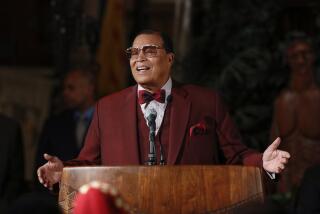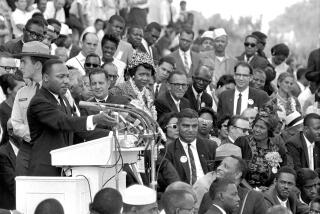The Farrakhan Paradox : A Search for Moral Authority
WASHINGTON — Louis Farrakhan’s rebuke on Thursday of his associate, Khalid Abdul Muhammad, for a vile and ugly speech delivered at Kean College in New Jersey last November was lim ited, bitter and contained what can only be interpreted as an endorsement of all of the substance of that speech. Though traditional black leaders can’t say it publicly, Farrakhan’s curious and contorted performance did them a big political favor. It loosened an embrace with him that was dismaying for some and uncomfortable for others--but from which they had found it difficult to extricate themselves.
At the annual Congressional Black Caucus weekend, two months before the Muhammad speech, caucus Chairman Kweisi Mfume (D-Md.) proclaimed that the caucus and the assembled black leaders would enter into a “sacred covenant” to work cooperatively with Farrakhan’s Nation of Islam. Jesse Jackson and Benjamin Chavis, executive director of the National Assn. for the Advancement of Colored People, were on the podium with Farrakhan and Mfume when the “covenant” was announced. Mfume’s announcement surprised some on the podium and, judging from comments they are now making, dismayed some of his colleagues in the caucus.
Considering Farrakhan’s history, the comment sent shudders of apprehension through the Jewish community. As an old friend of mine, a former staff member of a main-line Jewish organization said: “Won’t this Farrakhan problem ever go away? Until it does, there’ll always be deep divisions between Jews and blacks.”
In 1984, Farrakhan was barely known outside the black community. Most blacks knew him simply as a fiery orator who had become leader of one fragment of the religious empire once headed by Elijah Muhammad--for whom Malcolm X had served as chief spokesman. In that election year, Farrakhan threw his political support to Jackson’s bid for the Democratic presidential nomination. His comment that Judaism was a “gutter religion” became intertwined with extensive press discussions of Jackson’s own insensitive comments about Jews. White America was then introduced to the intensity of Farrakhan’s rhetoric and its deeply anti-Semitic subtexts.
Farrakhan quickly became the human embodiment of frictions long simmering between blacks and Jews. Many Jewish leaders urged first Jackson, then other prominent blacks to disavow both Farrakhan and his words. Many blacks were reluctant to do that for a variety of reasons, and several took great offense at the idea that denunciation of Farrakhan had been made into a litmus test for a continuation of good relationships between the groups.
In the years since 1984, Jackson has made consistent efforts--including a dramatic speech at the 1984 Democratic National Convention and a major address to the World Jewish Congress a year or so ago--to repair his relationship with the Jewish community. Other prominent members of the Jewish and black communities worked hard during the decade to heal the rifts. Then, last year, it began to look like even Farrakhan was moving to moderate his anti-Semitic image. The most dramatic gesture was a violin concert, where he performed works by Felix Mendelssohn, a Jewish composer.
While Jackson’s efforts have been appreciated by some (but by no means all) Jews, Farrakhan’s image had not improved much, if at all. Thus, the dismay when Mfume announced his “covenant,” with Farrakhan’s Nation of Islam.
But it was hard for black leaders to make the problem “go away,” because it has at least three prongs--all of which grow out of the acute problems that blacks continue to experience and many whites continue to deny.
The first is that our struggle for justice produces a utopian, but understandable yearning for unity among our people. The tactic of dividing then conquering us has been used effectively by our enemies over the centuries, and we hate to do it to ourselves.
The second problem is that many of us genuinely do admire some of the good works the Nation of Islam does. Its ability to rescue human spirits from the ravages of drugs or lives of crime and turn them into clean-living, constructive and spiritual human beings is enormously constructive. Moreover, the Nation of Islam is engaged in a number of anti-violence campaigns that we all encourage and applaud. For example, the Washington branch of the Nation cleaned up Paradise Gardens, a local housing project notorious as a haven for drug addicts and criminals.
The final problem is more complex. The most vulnerable people in our community are being brutalized by economic forces far beyond our control and by a politics shaped by a contempt of their fellow-citizens. America has allowed--with hardly any quibble--the construction of a deadly machine that destroys families and civility; robs children of youth, hope and morality at an early age, and kills babies on a daily basis. That machine is an unemployment rate that reaches 50% to 60%--even 65% in some neighborhoods, according to sociologist William Julius Wilson. The overall black unemployment rate has dipped below 10% in only one of the last 20 years. In essence, black America has been in a depression for the last two decades.
The people in these most ravaged precincts are in deep pain and, except for political bombast about crime and the end of “welfare as we know it,” the rest of America hardly notices. The traditional black leaders, though they have tried mightily, are unable to change this. Neither can Farrakhan, but he and his lieutenants can set the night on fire with cries of venom that unleash the clotted rage of the dispossessed and others--like college students--who see what is going on but are powerless to change things.
It is hard for black leaders, especially politicians who represent America’s most injured people, to wander out on the wrong side of these three curves. But this has severely strained the social-justice alliance that proved so fruitful in the past. We tend to romanticize the civil-rights era. There was, indeed, great cooperation between idealistic and activist Jews and blacks. But most Jews and most blacks did not participate in the civil-rights movement. And since there is a lot of racism and a lot of anti-Semitism in our culture, there are and always have been anti-Semitic blacks and racist Jews. But the major voices in those days were civil, warm and aligned.
Despite frictions about black demands for local control of schools in New York, antagonism from some Jewish precincts to affirmative action, differences about the Palestinian and South African problems, many Jews and blacks engaged in social-justice work have continued their cooperation over the years on a range of issues. Jackson’s strong efforts to make amends for his gaffes of a decade ago have been helpful. But until now, Farrakhan has been a continuing problem.
Judging from reactions to the current controversy from Black Caucus members such as John Lewis of Georgia, Major R. Owens of New York and Albert R. Wynn of Maryland, there is little appetite now--if there ever was--for a covenant with Farrakhan. That should ease tensions between blacks and Jews; as should the denunciations of the Muhammad speech by such prominent black figures as Jackson, Mfume and William H. Gray III of the United Negro College Fund.
Farrakhan has now deepened his isolation by endorsing the substance of Muhammad’s rabid and anti-human speech. Though black-Jewish relations are strengthened by all this, the big winner is the black leadership. Farrakhan’s inability to shake his obsession with Jews has always been at odds with the humanity and morality at the core of the African American struggle for justice. Blacks resented demands that they denounce Farrakhan, because they did not want others to dictate their message. But part of the decency of that message was diluted from the fringe. With his stubborn adherence to the substance of his subordinate’s vile message, Farrakhan himself has now handed control of their message back to the mainstream black leaders.*
More to Read
Get the L.A. Times Politics newsletter
Deeply reported insights into legislation, politics and policy from Sacramento, Washington and beyond. In your inbox three times per week.
You may occasionally receive promotional content from the Los Angeles Times.










